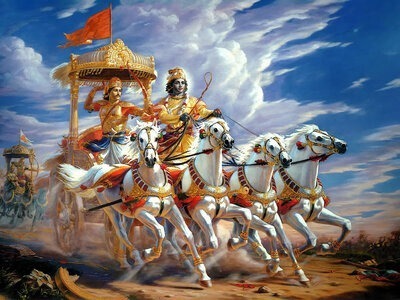
This article contains 18 important and famous quotes from Bhagavad Gita. These quotes are inspiring and explain the meaning of life and how to live a good life.
1. कर्मण्येवाधिकारस्ते मा फलेषु कदाचन।
मा कर्मफलहेतुर्भूर्मा ते सङ्गोऽस्त्वकर्मणि॥ २–४७
Meaning:
You have the right to perform your duty but not to the fruit. Do not let the fruit be your motive to act nor let your attachment be inaction.
2. नैनं छिन्दन्ति शस्त्राणि नैनं दहति पावकः । न चैनं क्लेदयन्त्यापो न शोषयति मारुतः ॥ २–२३
Meaning:
A soul can neither be cut by a weapon nor it can be burnt. Water can’t wet it and the wind can’t dry it.
3. यदा यदा हि धर्मस्य ग्लानिर्भवति भारत|
अभ्युत्थानंधर्मस्य तदात्मानं स्रुजाम्यहम्| ४–७
परित्राणाय साधूनां विनाशाय च दुष्कृताम्|
धर्मसंस्थापनार्थाय सम्भवामि युगे युगे| ४–८
Meaning:
Whenever there is a decay of righteousness, O Bharata,
And there is an exaltation of unrighteousness, then I descend myself,
For the protection of the good, for the destruction of evil-doers,
For the sake of firmly establishing righteousness, I am born from age to age.
4. न त्वेवाहं जातु नासं न त्वं नेमे जनाधिपाः | न चैव न भविष्याम: सर्वे वयमत: परम् || २–१२
Meaning:
Never was there a time when I did not exist, nor you, nor all these kings; nor in the future shall any of us cease to be.
5. न जायते म्रियते वा कदाचि नायं भूत्वा भविता वा न भूयः। अजो नित्यः शाश्वतोऽयं पुराणो न हन्यते हन्यमाने शरीरे ॥२–२०
Meaning:
The soul is neither born nor does it ever die; nor having once existed, does it ever cease to be. The soul is without birth, eternal, immortal, and ageless. It is not destroyed when the body is destroyed.
6. क्रोधाद्भवति संमोहः संमोहात्स्मृतिविभ्रमः।
स्मृतिभ्रंशाद् बुद्धिनाशो बुद्धिनाशात्प्रणश्यति।। २–६३
Meaning:
From anger comes delusion; from delusion loss of memory; from loss of memory the destruction of discrimination; from the destruction of discrimination, he perishes.
7. जातस्य हि ध्रुवो मृत्युर्ध्रुवं जन्म मृतस्य च | तस्मादपरिहार्येऽर्थे न त्वं शोचितुमर्हसि || २–२७
Meaning:
One who has taken his birth is sure to die, and after death one is sure to take birth again. Therefore, in the unavoidable discharge of your duty, you should not lament.
8. वासांसि जीर्णानि यथा विहाय नवानि गृह्वाति नरोऽपराणि। तथा शरीराणि विहाय जीर्णान्य–न्यानि संयाति नवानि देही।। २–२२
Meaning:
Just as human beings shed their old and worn-out clothes and don new attire, the soul sheds an old and worn-out body to don a new body.
9. महर्षीणां भृगुरहं गिरामस्म्येकमक्षरम् | यज्ञानां जपयज्ञोऽस्मि स्थावराणां हिमालय: || १०–२५
Meaning:
Of the great sages, I am Bhṛigu; of vibrations, I am the transcendental Om. Of sacrifices, I am the Japa (chanting of the holy names), and of immovable things, I am the Himalayas.
10. हतो वा प्राप्स्यसि स्वर्गं जित्वा वा भोक्ष्यसे महीम्। तस्मादुत्तिष्ठ कौन्तेय युद्धाय कृतनिश्चयः॥ २–३७
Meaning:
Die, and you will win heaven; conquer, and you will enjoy sovereignty of the earth;
therefore, stand up Arjuna, determined to fight.
11. यदा संहरते चायं कूर्मोऽङ्गानीव सर्वशः।
इन्द्रियाणीन्द्रियार्थेभ्यस्तस्य प्रज्ञा प्रतिष्ठिता॥ २–५८
One who is able to withdraw his senses from sense objects, as the tortoise draws its limbs within the shell, is firmly fixed in perfect consciousness.
12. श्रीभगवानुवाच कालोऽस्मि लोकक्षयकृत्प्रवृद्धो लोकान्समाहर्तुमिह प्रवृत्त: । ऋतेऽपि त्वां न भविष्यन्ति सर्वे येऽवस्थिता: प्रत्यनीकेषु योधा: ॥ ११–३२
Meaning:
The Supreme Lord said: I am Time, the great destroyer of the Worlds, and I have come here to destroy all people. Except for you [the Pandavas], all the soldiers here on both sides will be slain.
13. नात्यश्नतस्तु योगोऽस्ति न चैकान्तमनश्नत: । न चातिस्वप्नशीलस्य जाग्रतो नैव चार्जुन ॥ ६–१६
Meaning:
O Arjuna, there is no possibility of one’s becoming a yogi, if one eats too much, eats too little, sleeps too much, or does not sleep enough.
14. स्पर्शान्कृत्वा बहिर्बाह्यांश्चक्षुश्चैवान्तरे भ्रुवो: । प्राणापानौ समौ कृत्वा नासाभ्यन्तरचारिणौ ॥
यतेन्द्रियमनोबुद्धिर्मुनिर्मोक्षपरायण: । विगतेच्छाभयक्रोधो य: सदा मुक्त एव स: ॥ ५–२७.२८
Meaning: Shutting out all external sense objects, keeping the eyes and vision concentrated between the two eyebrows, suspending the inward and outward breaths within the nostrils, and thus controlling the mind, senses, and intelligence, the transcendentalist aiming at liberation becomes free from desire, fear, and anger. One who is always in this state is certainly liberated.
15. त्रिविधं नरकस्येदं द्वारं नाशनमात्मन: | काम: क्रोधस्तथा लोभस्तस्मादेतत्त्रयं त्यजेत् || १६.२१
Meaning:
Lust, anger, and greed are the three gates leading to the hell of self-destruction of the soul. Therefore, one should abandon them.
16. मात्रास्पर्शास्तु कौन्तेय शीतोष्णसुखदुःखदाः । आगमापायिनोऽनित्यास्तांस्तितिक्षस्व भारत ॥ २–१४
Meaning:
O son of Kunti, the contact between the senses and the sense objects gives rise to fleeting perceptions of happiness and distress. These are non-permanent and come and go like the winter and summer seasons. O descendent of Bharat, one must learn to tolerate them without being disturbed.
17. सत्त्वानुरूपा सर्वस्य श्रद्धा भवति भारत | श्रद्धामयोऽयं पुरुषो यो यच्छ्रद्ध: स एव स: || १७–३
The faith of all humans conforms to the nature of their minds. All people possess faith, and whatever the nature of their faith, that is verily what they are.
(You are what you believe in. You become that which you believe you can become.)
18. श्रेयान्स्वधर्मो विगुण: परधर्मात्स्वनुष्ठितात् | स्वभावनियतं कर्म कुर्वन्नाप्नोति किल्बिषम् || १८–४७
Meaning:
It is better to do one’s dharma, even though imperfectly, than to do another’s dharma, even though perfectly. By doing one’s innate duties, a person does not incur sin.
You May Also Like To Read: Interesting Facts About Bhagavad Gita
VERY WELL EXPLAINED